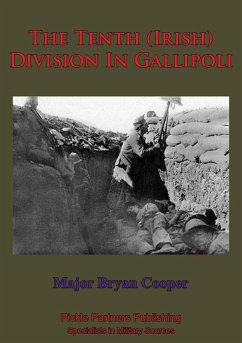
Why Gallipoli Matters: Interpreting Different Lessons From History (eBook, ePUB)

PAYBACK Punkte
1 °P sammeln!
After careful study of the Gallipoli Campaign of 1915, why did the British and the Americans come up to contradictory operational conclusions regarding the future applicability of amphibious operations? Divergent views from the lessons of Gallipoli campaign are the result of three differing operational approaches to strategic considerations that Britain and the Unites States faced in the 1920s and 1930s. The first were different theater strategic objectives that required different operational campaigns necessary to achieve each. The second was different operational experiences, which caused on...
After careful study of the Gallipoli Campaign of 1915, why did the British and the Americans come up to contradictory operational conclusions regarding the future applicability of amphibious operations? Divergent views from the lessons of Gallipoli campaign are the result of three differing operational approaches to strategic considerations that Britain and the Unites States faced in the 1920s and 1930s. The first were different theater strategic objectives that required different operational campaigns necessary to achieve each. The second was different operational experiences, which caused one side to focus on the past while the other to the future. The final was the different means available to operational commanders to execute their campaign.History can often provide contradictory lessons to those who wish to use it to practically apply operational art. Using analogies correctly is important. For the operational commander, drawing the correct lessons learned is made even more difficult by the very nature of inter-service rivalry. Derived from an analysis of the operational art and at operational level of war, the lessons learned from this campaign led directly to the development of sound doctrine, which developed in peacetime was absolutely essential in wartime. Finally, we continue to learn from failure more often than through success, but we must not allow ourselves to be intimidated by failure either.
Dieser Download kann aus rechtlichen Gründen nur mit Rechnungsadresse in A, B, BG, CY, CZ, D, DK, EW, E, FIN, F, GR, HR, H, IRL, I, LT, L, LR, M, NL, PL, P, R, S, SLO, SK ausgeliefert werden.





![NEW ZEALANDERS AT GALLIPOLI [Illustrated Edition] (eBook, ePUB) Cover NEW ZEALANDERS AT GALLIPOLI [Illustrated Edition] (eBook, ePUB)](https://bilder.buecher.de/produkte/41/41519/41519559n.jpg)

![ANTWERP TO GALLIPOLI - A Year of the War on Many Fronts - and Behind Them [Illustrated Edition] (eBook, ePUB) Cover ANTWERP TO GALLIPOLI - A Year of the War on Many Fronts - and Behind Them [Illustrated Edition] (eBook, ePUB)](https://bilder.buecher.de/produkte/42/42399/42399661n.jpg)

![From Gallipoli To Baghdad [Illustrated Edition] (eBook, ePUB) Cover From Gallipoli To Baghdad [Illustrated Edition] (eBook, ePUB)](https://bilder.buecher.de/produkte/42/42293/42293925n.jpg)



